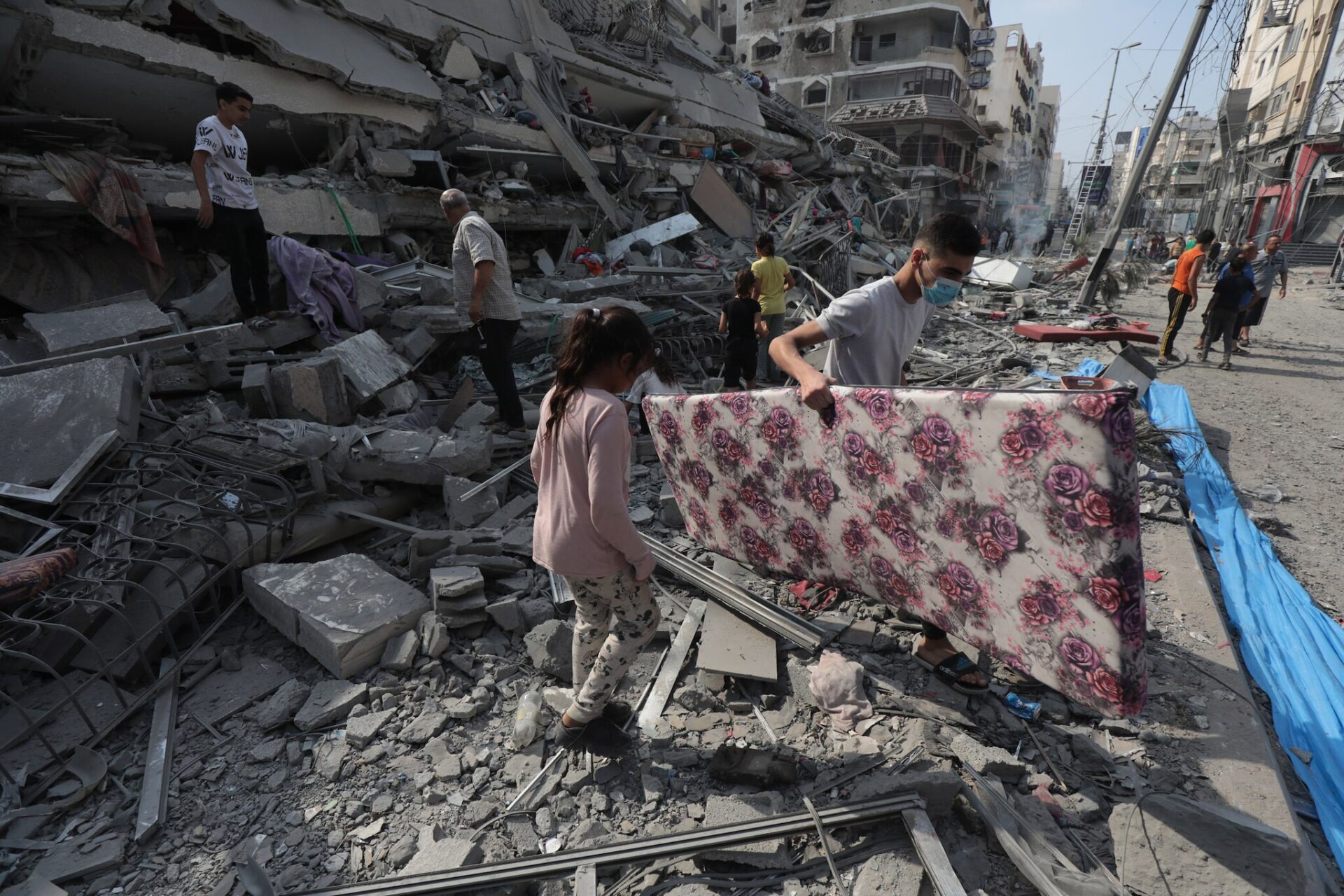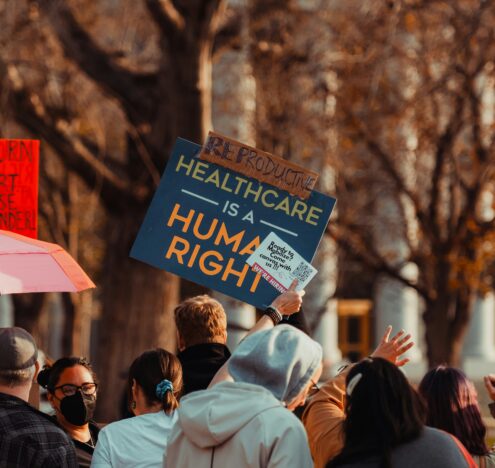Eid al-Fitr, the holiday that marks the end of Ramadan, in the Gaza Strip has historically been marked by communal joy and celebration. The streets of Gaza’s dense refugee camps would come alive, pulsing with laughter. Children would play with their new toys, while adults indulged in the tradition of visiting relatives. These celebrations have always been a part of the fabric of the community, bonds that have long defined the spirit of Gaza. Yet, this year’s Eid paints a starkly different picture, with more than 33,500 deaths and 76,000 injuries since the war erupted on Oct. 7.
Wandering the very lanes they have walked their whole lives, Palestinians in Gaza meet an unrecognizable silence. The once rhythmic chants of Eid prayers that echoed at dawn are conspicuously absent, leaving an eerie quiet in their wake. The familial warmth of gatherings, a cornerstone of Eid’s essence, now feels like a distant memory, as homes that once buzzed with tales and laughter sit somber. The tradition of exchanging visits and gifts among relatives — each act a thread in the tight-knit fabric of Gaza’s communities — has paused, leaving a void in the hearts of Gaza’s 2.3 million, now displaced residents.
“Nothing But Sadness”
For Teshreen Sultan, 28, and her family, this Eid marks a departure from the celebrations of previous years, unveiling a somber reflection on loss, resilience, and the indomitable spirit of a community grappling with the consequences of ongoing strife. “Eid al-Fitr, for me, is the home of my grandparents, whom I have been deprived of seeing for more than seven months,” she says. “The Eid has come, and I cannot see them, nor do they come to visit me,” she said.
This year’s Eid, according to her, “greeted us with nothing but sadness and anguish.” Recollecting the previous year’s festivities, she recalls the joy of celebrating her daughter Lina’s first Eid, a time when the simple act of buying new clothes symbolized a continuation of tradition and happiness. But a sense of loss shrouds this Eid.
“The most beautiful moment of Eid is when I gather with all those I love, and we imagine and stay up late and order food from outside,” Teshreen recounts. Yet, the customary Eid prayer, a hallmark of the celebration, felt empty. “In this Eid, I didn’t attend the usual prayer because it doesn’t feel like Eid at all for us.”
Instead of anticipation and joy, tears and sorrow marred the eve of Eid. “Everyone slept on the eve of Eid with tears and a heavy heart,” Sultan says. “In the morning, we wanted to make the children happy, so we brought the available chocolate and biscuits and gave them an Eid gift.”
“Martyred, Afraid, and Displaced”
This presumed happy event has evoked deep personal tragedies — the loss of Teshreen’s grandfather, Helmi, 83, at the war’s outset, and her cousin, Sama, 10, as a result of the Israeli airstrikes — underscoring the profound impact of the conflict on individual lives. “My grandfather, Helmi, was killed by Israel at the beginning of the war … I had a strange happy feeling that he died first so he didn’t have to experience displacement again as he did in the 1948 Nakba and the Naksa of 1967,” she explains. To her, her cousin Sama’s death is a poignant reminder of the indiscriminate cruelty of war. “My sadness over the way she died was greater than her death; she was also martyred, afraid, and displaced.”
My grandfather, Helmi, was killed by Israel at the beginning of the war.
– Teshreen Sultan
Teshreen’s reflection on her attachment to Gaza encapsulates a complex love — akin to that for a “cruel mother” who inflicts pain yet remains an integral part of one’s identity. “Gaza for us is like a cruel mother who causes wounds to her children and creates difficult psychological trauma, making the concept of living normally difficult. But she remains the mother whom we never stop loving,” she continues.
Reflecting on the prospect of leaving Gaza, she contemplates the difficulty of severing ties with a place so ingrained in one’s identity, despite the pain it harbors. “The matter is more difficult than we imagine,” she adds. “It is very difficult to break away from your memories and your old life to live a decent life outside of Gaza.”
Profound Love, Profound Suffering
For many Palestinians in Gaza, their homeland is a place of duality — a place of both profound love and profound suffering. And for those who left the enclave, the essence of this place remains indelibly etched in their hearts.
Like thousands of others, Rajaa Abu Jasser’s life in the al-Sabra neighborhood — once defined by her routine as a UN English teacher and the warmth of family life — was irrevocably changed. As the conflict intensified, Rajaa, 35, faced decisions that would lead her far from the familiarity of home and into the uncertainty of exile.
Rajaa’s struggle begins in the heart of western Gaza, where the escalating violence disrupts the rhythm of daily life. “Since the beginning of the war, I have not moved to the south,” she remembers. “The more intense the bombing became, the more [often] I would move to the Jabaliya camp near my parents’ house, and after a few days, I would return to my home in the al-Sabra neighborhood.”
This oscillation between refuge and home became a harrowing routine, driven by the desperate hope for a reprieve that never came. The toll was devastating among her husband’s family. “The Israeli attacks in our neighborhood led to the deaths of approximately 110 people from my husband’s family and significant damage to my home,” she says.
Specter of Starvation
Amid the destruction of her house, the specter of starvation loomed large, pushing Rajaa’s family to the brink. The famine that Israel enforced on Gaza has turned basic sustenance into a luxury. Rajaa recalls the days when she “had no bread to feed my children,” adding: “I had to buy one kilo of flour for about $40, and it was mostly not available.” The relentless hunger and the struggle to provide for her children gnawed at her, leading to sleepless nights consumed by worry and fear for their future.
Despair overtook hope, driving Rajaa to a momentous decision. “I lost hope entirely, [and] I lost hope that there would be a ceasefire in Gaza. I didn’t want to sit and watch my children suffer before my eyes, so I decided to leave Gaza,” she explains.
When she speaks, her voice carries the weight of this heartbreaking choice. With the assistance of friends beyond Gaza’s confines, Rajaa and her five children embarked on a costly journey to safety, facilitated by an Egyptian company coordinating departures through the Rafah-Egypt border crossing. The financial and emotional cost was steep, with the family paying around $30,000 for a chance at escape, a sum raised through the solidarity of a friend-driven fundraiser — their only chance to escape the looming death in Gaza.
“Had to Flee to Survive”
The departure from Gaza was not just a physical separation but a rending of the fabric of Rajaa’s identity. She left behind her husband, Mohammed, who stayed to support his aging parents, and a life interwoven with the community, culture, and traditions of her homeland. “It’s heartbreaking that I had to flee to Egypt to survive instead of being close to my family and my parents,” Rajaa reflects.
In Egypt, the absence of familiar faces and the joy of communal gatherings during Eid starkly underscored the isolation of her new reality. Eid, once a time of vibrant celebration and togetherness, became a painful reminder of all they lost. “For children, Eid is all about being united with their cousins, friends, and relatives to feel joy,” Rajaa says. “It’s painful. They feel nothing.”
Attempting to recreate the spirit of Eid for her children, she engaged in small activities to offer them a semblance of normalcy, yet her heart remained with those still enduring the horrors of war back home. “I feel ashamed of going out and feeling happiness while the rest of my family and friends are still living a genocide,” she admits. “I left Gaza, but Gaza never left me — my heart and my thoughts are still there.”





















